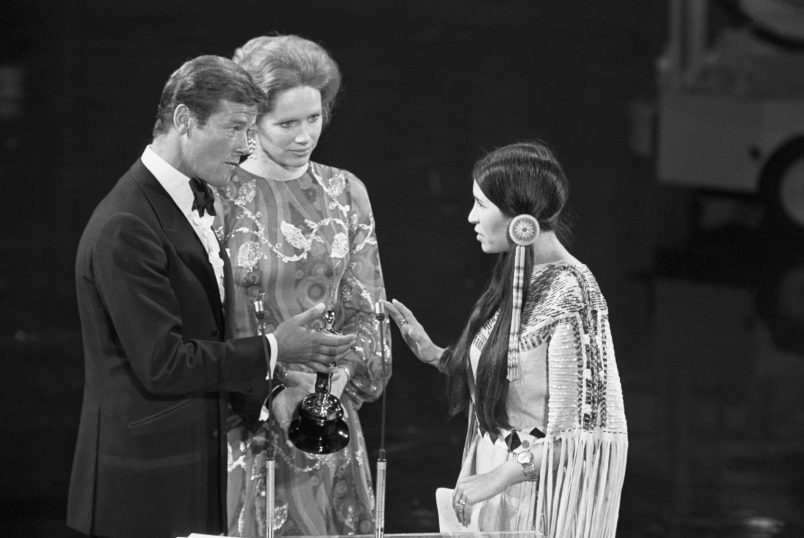If you’re of a certain age you likely remember the Sacheen Littlefeather, the Native American actress who Marlon Brando chose to receive and ultimately refuse on his behalf the Oscar he won for his appearance in The Godfather. She died earlier this month at age 75. Her appearance at the Oscars in 1973 was the scene of immense controversy at the time and the Academy actually issued a formal apology to her shortly before her death. This morning I read this column in The San Francisco Chronicle which claims that her entire life story of Native American ancestry (specifically White Mountain Apache and Yaqui) was fabricated.
This is a pretty big claim, needless to say. The article focuses on the testimony of her two sisters who say that not only did Littlefeather not have Native American ancestry but that her personal story of childhood privation and an abusive and alcoholic Native American father was also fabricated. We should always have some caution about delving into the conflicting accounts and recollections of any single family. They have histories, interpersonal disputes that are hard for us as outsiders to understand or litigate. But the column by Jacqueline Keeler doesn’t rely exclusively on the accounts of Littlefeather’s sisters, Rosalind Cruz and Trudy Orlandi. Keeler also presents a fairly detailed genealogy of Littlefeather’s going back several generations which includes no Native ancestry whatsoever.
In short, Littlefeather’s background was Anglo (French, German and Dutch) on her mother’s side and Mexican-American on her father’s. She was born Maria Louisa Cruz in Salinas, California in 1946. Her father was born in Oxnard but had ancestry in Mexico. Of course, most Mexicans have mixed or Mestizo backgrounds, which means that part of their ancestry is native to the Americas. But Keeler found no ties to any recognized tribal entity on either side of the border going back several generations. And through her public life Littlefeather claimed to be a member of a specific federally recognized tribe, The White Mountain Apache. They apparently have no record of her membership or any connection to her.
It is further important to note that recognition by a federally recognized tribe isn’t the end of the story on what can be a highly fraught and controversial issue within the broader Native American community. Not all tribes have federal recognition. And there are real questions and controversies about how different tribes count or approve their members. Indeed, there are cases in which people of mixed African and Native ancestry have been written out of various tribes. In any case, my point is simply that there’s a lot of controversy over these things and controversies that are hard to discuss intelligently or with much standing if you’re not very well versed in them or part of these communities. But Keeler appears to show that there’s no evidence of Native ancestry or even claims of Native ancestry in her family predating her.
Obviously, we have to take the word of Keeler that she compiled the ancestry record she claims. But I certainly assume the Chronicle would do and has done that basic level of factchecking. The article presents what seems like a very compelling case that Littlefeather’s story was simply not true. She was a Mexican American woman born in California in the middle of the 20th century with no documented Native American ancestry or connection to any recognized or unrecognized Native tribe in the United States or Mexico. After the famed moment in 1973, Littlefeather spent the rest of her life involved in various forms of Native activism.
Given how serious a claim or charge this is and the fact that I’m coming to it with no background knowledge I want to leave open the possibility that there’s some counterclaim or rebuttal. But again, the article seems pretty conclusive.


